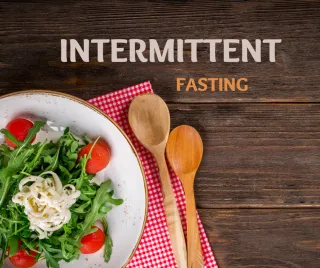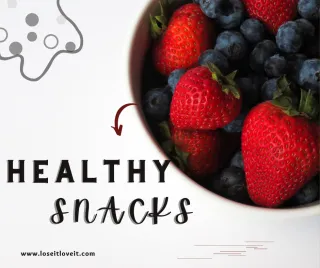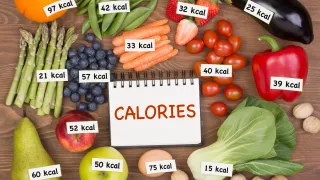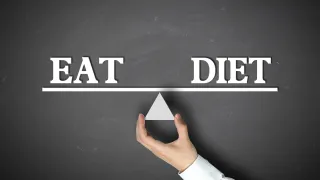Unveiling the Benefits of Intermittent Fasting: A Guide to Harnessing the Power of Time-Restricted Eating
Intermittent fasting has surged in popularity as a dietary approach that offers a range of potential benefits for both body and mind. ...more
Blogs ,Weight Loss Category &Wellness category
May 15, 2024•3 min read

The Power of Healthy Snacking: Nourishing Your Body One Bite at a Time
In our fast-paced world, snacking has become a common habit for many individuals looking to curb hunger between meals, fuel their bodies, and maintain energy levels throughout the day. ...more
Blogs ,Weight Loss Category &Wellness category
May 15, 2024•4 min read

Journey Too Loose Weight
Sometimes, thinking of a weight-loss journey seems impossible, but in reality, you won't have to sacrifice a lot to look good. ...more
Blogs ,Weight Loss Category &Wellness category
May 14, 2024•3 min read

"Embrace the Sacred Pact: Nurture Your Body, Witness Its Care in Return"

To Feel Good Does Not Mean You Need To Be Skinny, It Means You Need To Be Healthy And Happy
To Feel Good Does Not Mean You Need To Be Skinny, It Means You Need To Be Healthy And Happy
If you’re looking to lose weight, you don’t need to make drastic sacrifices. With Lose It Love It, you can live a healthier life without going through any unnecessary hardships.
All you need is consistency and dedication. With us, you can achieve your goals without making any drastic sacrifices.
Remember that perfection does not exist and is not attainable.
So when someone inevitably has an imperfect eating day or “falls off the wagon,” they stop their healthy efforts altogether
Instead, focus on making small changes consistently over time and dedicate yourself to achieving your goals
The Importance Of Eating Healthy: Nourishing Your Body for Optimal Well-being
In today's fast-paced world, it's easy to overlook the significance of maintaining a healthy diet. However, our food plays a vital role in shaping our overall well-being. This blog post will explore why eating healthy is crucial for our bodies and how it can positively impact our lives.
A balanced and nutritious diet gives our bodies the essential nutrients to function optimally. Fresh fruits and vegetables, whole grains. Lean proteins and healthy fats all contribute to a well-rounded diet. These nutrients fuel our cells, support growth and repair, boost our immune system, and promote overall vitality.
A healthy diet can significantly reduce the risk of chronic diseases. Consuming various nutrient-dense foods, such as leafy greens, berries, and legumes, can help lower the risk of heart disease, hypertension, diabetes, and certain types of cancer.
Eating a balanced diet can assist you in weight management and promote a healthy body composition. Focusing on whole foods and portion control can supply our bodies with the necessary nutrients while avoiding excessive calorie intake. Combined with regular physical activity, a healthy diet can help maintain a healthy weight and reduce the risk of obesity-related conditions.
The impact of our healthy diet extends beyond physical health and influences our mental well-being. Research suggests that certain nutrients, such as omega-3 fatty acids, B vitamins, and antioxidants, support cognitive function and mood regulation. Nourishing our bodies with these nutrients promotes mental clarity, focus, and emotional balance.
Best Ways To Lose Weight
Get active for 150 minutes a week – you can break this up into shorter sessions.
Aim to get your 5 A Day – 80g of fresh, canned or frozen fruit or vegetables count as one portion.
A week, aim to lose 1 to 2 lbs, or 0.5 to 1kg.
Read food labels – products with more green colour coding than amber and red are often a healthier option.
Swap sugary drinks for water – if you do not like the taste, add slices of lemon or lime for flavour.
Cut down on food that's high in sugar and fat – start by swapping sugary cereal for wholegrain alternatives.
Share your weight loss plan with someone you trust – they can help motivate you when you have a bad day.

What Is The Correct Way To Calculate My Calorie intake?
You need energy from calories for your body to work correctly. Your body uses this energy to function properly. To stay around the same weight, your body's calories should be the same as the amount of calories you eat and drink. Your body weight may change if you use the same calories as you eat and drink.
For example, you'll be less likely to lose weight if you eat and drink more calories than you use. This is because your body stores the extra energy as fat. You'll likely lose weight if you eat and drink fewer calories than you use. This is because your body uses its stored fat for energy.
As a guide:
An average man needs 2,500kcal a day
An average woman needs 2,000kcal a day
Check if you are maintaining a healthy weight by calculating your BMI here.

What To Avoid When Losing Weight?
Do not stock unhealthy food – popcorn, fruit, and rice cakes can be healthier alternatives.
Do not skip meals – you might end up snacking more because you feel hungry.
Do not finish your plate if you're full – you can save leftover food for the next day.
Keep the balance in your diet, If you crave for piece of cake, have it, but compensate for that with a healthy meal later on.
Balance is very important!

What Are Physical Activity Guidelines For Adults Aged 19 to 64
Adults should do some physical activity every day.
Exercising just once or twice a week can reduce the risk of heart disease or stroke.
Speak to your GP first if you have not exercised for some time or if you have medical conditions or concerns. Make sure your activity and its intensity are appropriate for your fitness.
Adults should aim to:
Do strengthening activities that work all the major muscle groups (legs, hips, back, abdomen, chest, shoulders, and arms) at least two days a week.
Do at least 150 minutes of moderate-intensity activity a week or 75 minutes of vigorous activity weekly.
Spread exercise evenly over 4 to 5 days a week or every day.
Reduce time spent sitting or lying down and break up periods of not moving with some activity.
You can also achieve your weekly activity target with Several short sessions of very vigorous-intensity activity, a mix of moderate, vigorous, and vigorous-intensity activity.

In the realm of human experiences, few journeys are as poignant and challenging as the one through dementia. It is a path shrouded in a mist that obscures memories, blurs identities, and tests the strength of both individuals and their loved ones. Join us as we embark on a metaphorical exploration of this labyrinthine landscape, seeking understanding, compassion, and hope amidst the shadows.
This practical Guidebook is a guide for everyday interaction with dementia patients. Concrete tips on how to resolve conflicts and basic information on the course of the disease guide relatives and caregivers to the right action in each situation.
(Read more HERE)

Exercise
How many of you go to the gym versus exercising at home, or maybe you want to start at home but are not sure what exactly to do? There are people who would rather work on their own in the comfort of their homes instead of going to the gym and sweating in front of a bunch of other people. If you are one of them here is a quick exercise routine that you could use it, this is not exercise to grow muscle just to keep your self fit and healthy.
Warm-up (5-10 minutes):
Start with a quick warm-up to prepare your body for exercise. You can do activities like jumping jacks, high knees, or walking around your house.
Strength Training (3 times a week):
Bodyweight squats: 3 sets of 15 repsPush-ups (can start on your knees if needed):
3 sets of 10 reps
Plank: Hold for 30 seconds to 1 minute
Bodyweight lunges: 3 sets of 12 reps per leg
Cardiovascular Exercise (3-5 times a week):
Jumping jacks: 3 sets of 30 seconds
Dancing to your favourite music: 15-20 minutes
Jump rope: 3 sets of 1-minute
Running in place: 3 sets of 1 minute
Flexibility and Stretching (daily):
Stretch your major muscle groups for 10-15 minutes daily to improve flexibility and prevent injury. Focus on hamstrings, quadriceps, calves, shoulders, and back.
Cool Down (5-10 minutes):
Finish your workout with a cool down to bring your heart rate back to normal. You can do some light stretching or yoga poses to help your muscles relax.
Remember to listen to your body and modify exercises as needed. Consistency is key, so try to stick to your routine and gradually increase intensity as you get stronger. Additionally, consider incorporating activities you enjoy to make your workouts more fun and sustainable.
READ MORE OF OUR BLOGS HERE
Subscribe And Be The First To Know The Update
© 2024 Melada - All Rights Reserved,
Disclaimer: The publisher may earn small commissions through the affiliate links.
meladapublishing@gmail.com


